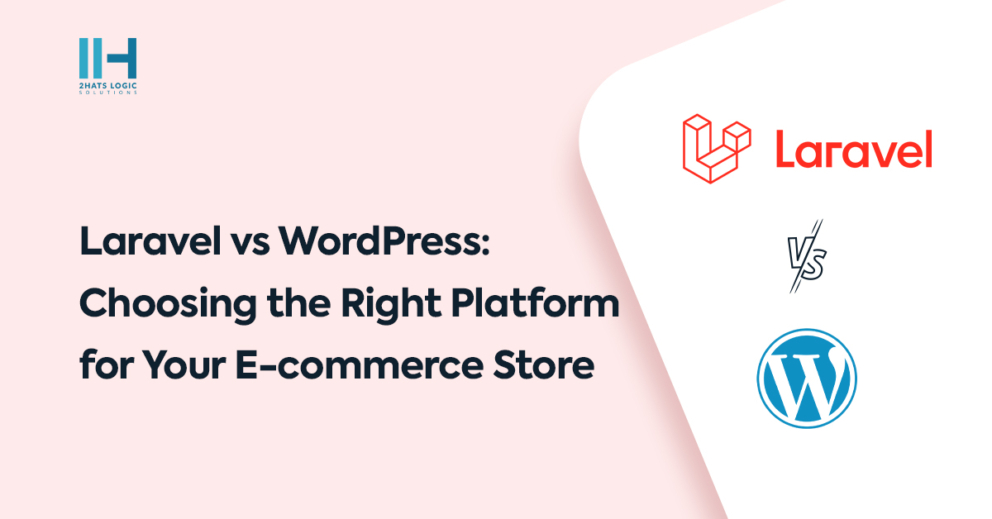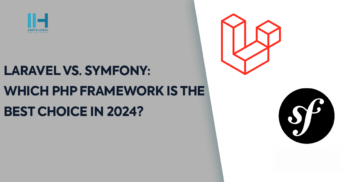Greetings! I'm Aneesh Sreedharan, CEO of 2Hats Logic Solutions. At 2Hats Logic Solutions, we are dedicated to providing technical expertise and resolving your concerns in the world of technology. Our blog page serves as a resource where we share insights and experiences, offering valuable perspectives on your queries.

Deciding on the right platform is a crucial step in establishing a successful e-commerce store. It significantly shapes the website’s functionality, scalability, and user experience. In the realm of e-commerce development, two prominent platforms often considered are Laravel and WordPress.
Laravel, a PHP web application framework, is renowned for its robust architecture and flexibility, enabling developers to craft customized and high-performance e-commerce solutions. Conversely, WordPress, a widely-used content management system, provides e-commerce capabilities through plugins like WooCommerce. The choice between Laravel and WordPress depends on factors such as project complexity, development expertise, and desired features.
In the competitive digital landscape, understanding the strengths and limitations of each platform is crucial. Making informed decisions that align with the unique requirements of your e-commerce venture is essential for success. In this blog let’s take a look at how to choose the right platform for your business.
Advantages of Laravel
Customization and Flexibility
Laravel offers a high degree of customization and flexibility, allowing developers to tailor solutions to specific business needs. Its modular structure and elegant syntax facilitate the creation of bespoke features, ensuring a customized e-commerce experience.
Scalability and Performance
Laravel is recognized for its scalability, enabling e-commerce platforms to grow seamlessly as the business expands. Its robust architecture and efficient handling of database queries contribute to enhanced performance, making it suitable for businesses anticipating growth.
Developer Skillset
Choosing Laravel necessitates a skilled development team. With the right expertise, developers can effectively implement advanced features and intricate architecture, ensuring a smooth development process and optimal utilization of Laravel’s capabilities.
Security Measures
Laravel comes equipped with built-in security features, providing a solid foundation for protecting e-commerce stores against common threats. However, maintaining security also relies on the quality of code and ongoing maintenance practices.
Disadvantages of Laravel
Learning Curve
Laravel’s feature-rich environment may pose a learning curve for new developers. Familiarity with its advanced features is essential for harnessing its full potential.
Resource Intensity
While Laravel offers robust performance, resource-intensive processes may affect server load. Optimization strategies are crucial for maintaining efficiency in resource usage.
Community Size
While Laravel has a growing community, it may not be as extensive as some other frameworks. This could impact the availability of third-party resources and community support.
Regular Updates
Keeping up with Laravel updates is essential for security and feature enhancements. However, the need for updates can sometimes result in challenges for projects with extensive customizations.
Advantages of WordPress
Ease of Use and Quick Deployment
WordPress is renowned for its user-friendly interface, making it accessible to beginners. Its intuitive dashboard and simple navigation contribute to a swift learning curve. Quick deployment is a strong suit, especially for smaller projects. The one-click installation process and a plethora of hosting options make it easy for users to get their websites up and running in no time.
Ecosystem and Community Support
The extensive ecosystem of themes and plugins is a major advantage. Users have a vast array of options to customize their websites according to their specific needs.WordPress boasts a robust community with active forums, tutorials, and documentation. This support network is invaluable for troubleshooting, sharing insights, and staying updated on the latest trends and technologies.
Content Management and SEO
WordPress excels as a content management system (CMS), providing a user-friendly interface for managing and organizing content. The WYSIWYG editor simplifies content creation. SEO-friendly features, such as customizable permalinks, sitemaps, and plugins like Yoast SEO, empower users to optimize their content for search engines effectively.
Scalability and Performance Considerations
For smaller to medium-sized projects, WordPress offers good scalability. It can handle growing content and traffic, and numerous optimization techniques are available to enhance performance. With the right hosting and optimization strategies, WordPress can deliver satisfactory performance. Content delivery networks (CDNs) and caching plugins contribute to faster loading times.
Disadvantages of WordPress
Ease of Use and Quick Deployment
While WordPress is user-friendly, its simplicity can be limiting for advanced users who seek more control over intricate design and functionality aspects. Quick deployment might lead to a generic look for websites due to the prevalence of popular themes, potentially diminishing uniqueness.
Ecosystem and Community Support
The abundance of themes and plugins can be a double-edged sword. Poorly coded or outdated plugins/themes may lead to compatibility issues, security vulnerabilities, or performance bottlenecks. Relying heavily on community support can sometimes result in slower responses to critical issues or the absence of official support channels for certain plugins.
Content Management and SEO
WordPress is excellent for content management, but it may become difficult for extremely large websites with complex content structures. Customizing intricate layouts can be challenging. The SEO-friendliness of WordPress relies on the proper configuration of plugins and settings. Without proper optimization, achieving high SEO rankings may be more challenging.
Scalability and Performance Considerations
WordPress can face scalability challenges for extremely large and complex projects. Managing a high volume of simultaneous users or extensive databases may require significant server resources. Performance issues may arise if plugins are not optimized or if the chosen hosting environment lacks the necessary resources. Continuous monitoring and optimization are crucial for maintaining satisfactory performance.
Laravel vs. WordPress: Common Feature Considerations
Laravel
Laravel is the best PHP framework known for its elegant syntax and robust features. It excels in building scalable and maintainable web applications.
Mobile responsiveness
It is inherent in Laravel’s design, allowing developers to create seamless and adaptive user interfaces for a diverse audience.
Payment Gateway Integration
This is streamlined in Laravel, offering a wide range of libraries and packages for integrating with popular payment gateways. This ensures that e-commerce transactions are smooth, secure, and reliable.
Security Measures
Laravel emphasizes security with built-in features such as CSRF protection, encryption, and middleware. Regular updates and a strong community contribute to a secure environment, making it a trustworthy choice for web development.
SEO Features
Laravel provides tools and conventions to optimize websites for search engines. Clean and semantic code, along with customizable URL structures, allows developers to enhance the SEO performance of Laravel applications.
Hosting Requirements
Laravel applications typically require a web server, PHP, and a database. Choosing a reliable hosting provider with support for PHP and Laravel-specific optimizations is essential. Additionally, performance optimization strategies like caching and database indexing can further enhance the application’s speed.
WordPress
WordPress, a widely used content management system (CMS), is renowned for its user-friendly interface and extensive plugin ecosystem.
Mobile responsiveness
This is a key focus in WordPress, with themes and plugins catering to various devices, ensuring a consistent user experience.
Payment Gateway Integration
Payment gateway integration is seamless in WordPress, thanks to numerous plugins that support integration with major payment gateways. This simplifies the process for website owners, making online transactions efficient and secure.
Security Measures
WordPress prioritizes security, offering features like user roles, SSL support, and regular updates. Utilising security plugins, strong passwords, and monitoring for potential vulnerabilities ensures a secure WordPress website.
SEO Features
WordPress is inherently SEO-friendly, featuring customizable permalinks, meta tags, and XML sitemaps. Additionally, a plethora of SEO plugins allow users to fine-tune their website’s performance on search engines.
Hosting Requirements
WordPress requires a web server, PHP, and a database. Many hosting providers offer specialized WordPress hosting with optimizations for speed and security. Content delivery network (CDN) integration and image optimization can further enhance website performance.
Conclusion
In conclusion, the choice between Laravel and WordPress ultimately depends on your specific needs. Consider factors such as scalability, customization, ease of use, and the technical expertise of your team. Laravel is ideal for robust, scalable applications, while WordPress excels in user-friendly content management. If you require any expert advice regarding choosing between a platform and any other ecommerce services feel free to contact us here.
FAQ
I'm just starting my e-commerce business – which platform is easier to use?
For ease of use and quick deployment, WordPress shines. Its intuitive interface and pre-built themes make it perfect for beginners. However, if you crave ultimate customization or anticipate rapid growth, Laravel might be a better long-term choice
What about scalability? Can my e-commerce store grow with the platform?
Both platforms offer good scalability for smaller to medium-sized stores. While WordPress can handle moderate growth with optimization, Laravel excels at scaling for large, complex e-commerce platforms. Consider your future growth plans when making your decision.
Which platform is better?
Laravel's flexibility and robust architecture make it ideal for building highly customized features. However, custom development expertise is crucial. While certain WordPress plugins might offer some advanced functionalities, the level of customization won't be as extensive as with Laravel.
I'm concerned about security – which platform is more secure?
Both platforms prioritize security with built-in features and updates. Laravel boasts strong security tools by default, but maintaining security also relies on good coding practices and updates. WordPress excels in user-friendly security configurations, but relying heavily on plugins can introduce vulnerabilities if not carefully chosen and maintained.
I don't have a technical team – can I still build my e-commerce store with either platform?
While WordPress comes with user-friendly tools for basic setup, building a successful e-commerce store often requires some technical knowledge, especially for plugins and customization. If you lack internal expertise, consider hiring freelancers or agencies specializing in your chosen platform to build and manage your store.

Related Articles







